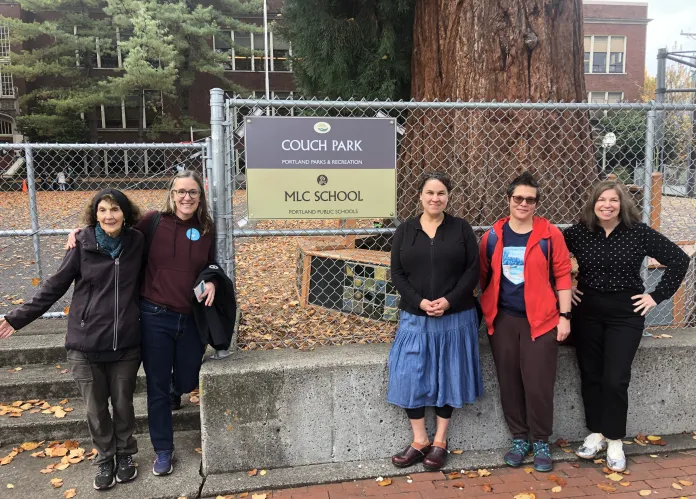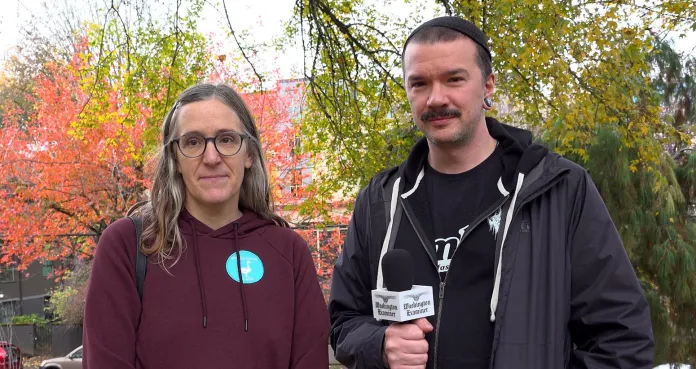PORTLAND, Oregon — At 11 a.m. every Friday, Friends of Couch Park meet for coffee to discuss how to better their small space in Portland. It’s a simple way for the local community to tackle issues caused by the increasing homeless population and try to create a safe haven from crime and rampant drug use in the city.
“We’re an additional set of eyes,” Kara Shane Colley, the president of Friends of Couch Park, said. “We are the citizen neighbors. We just believe, in this park, people should not be allowed to camp next to it, and people should not be able to do drugs. I think that’s a reasonable ask.”
Allan Classen, who has lived in Portland since the 1980s, is a regular on coffee Fridays. He attributes the increase in crime and homelessness in Portland to policies allowing people to live on the streets if they choose.
“’Yeah, I can sleep here, I can do drugs here; no one will do anything about it,’” Classen, who is the editor and publisher of the Northwest Examiner, said. “And it got so bad, there’s a fella with a machete in the park by a school, and the police say, ‘It’s not illegal to have a machete.’ Is that a rational response?”
In 2023, Friends of Couch Park started in reaction to a slew of tents set up in the park and a man with a machete threatening people in the park. Classen believes the homeless encampments create a crime bubble that has gotten out of control and is in favor of Mayor Keith Wilson’s sweeps.
“I mean, do we clean our houses? Do we say cleaning isn’t a permanent solution?” Classen said. “You have to keep doing it. Healthy societies do what’s necessary to maintain a positive equilibrium.”
“I, for one, am happy the mayor is starting to enforce the camping ban,” Colley, who testified at a Portland City Council meeting in favor of funding sweeps, said. “Not because we’re trying to criminalize homelessness, but because there are certain places, like a school, where no camping should ever be allowed, and there are certain camps that just get out of control, where there’s just the drug use is crazy.”

The group has worked with the city to add signage to let people know the building adjacent to the park is a school, the Metropolitan Learning Center, to discourage drug use and criminal activity.
“No one knows it’s a school!” Colley said. “We contacted the parks department, we contacted the principal, and there’s a sign that labels it as a Couch Park, and then it labels it as MLC school. I know it’s small; it just feels like a victory. We’re pretty excited.”
The sign is now hanging on the fence separating the park and the school’s basketball court. The group took a photo together to commemorate their small but meaningful win.
“I always try to emphasize that as friends of Couch Park, we can hold complex thoughts in our head,” Colley said. “What I mean by that is I have compassion for the homeless, I have compassion for people with substance use disorder. What is not OK is doing fentanyl in a park.”
The group is also trying to shut down the public restroom during the day, gathering complaints from parents and community members and sending them up the chain to the parks department and city council.
“Many parents who, their children go to that school, just wanted the bathroom locked because they felt like the bathroom was attracting people who were not following the laws.” Colley, a mother of two in Portland Public Schools, said. “They just felt it was attracting dangerous folks or people in mental health crisis, and they’re like, ‘We don’t want this bathroom open.’”
Friends of Couch Park is currently trying to broker a compromise to give the key of the bathroom to the principal to lock it during the day and unlock it when school gets out.
“Neighbors and business owners told us we want the bathroom to be open at night, so people aren’t just using the sidewalks as a toilet,” Colley said.

Max Steele is a local small business owner and has lived in Portland for 20 years. As the treasurer of Friends of Couch Park, he works on filling the space with various activities to encourage community involvement.
“A lot of what we did was activate the space with giant Jenga, giant Connect Four, cornhole, coffee, caroling,” Steele said. “I held a little Tu BiShvat ceremony, which is the Jewish New Year for the trees. Just bringing people into the park and showing them the million or more things that are supposed to be happening here, as a counter example to the handful of things that, yeah, we would really like to see a lot less of.”
“We make society work with our own friends and neighbors in our community and making public spaces positive places,” Classen said. “‘Oh, I want to go to the park. It’s pleasant there.’ So you’re creating a positive culture, which tends to discourage what happens in a vacuum.”
The group says it has seen a positive improvement in the community due to its efforts since starting the group a couple of years ago.
PORTLAND RESIDENTS AND BUSINESSES ADJUST AS CITY SEES INCREASE IN HOMELESSNESS AND CRIME
“I think it’s pretty easy to see that there’s been a positive trend,” Steele, the owner of Kanabo Fitness, said. “I think the worry is it hasn’t come soon enough, and it’s a little too slow. As a business owner, yeah, business is up. Foot traffic is up. It hasn’t doubled, but it is better.”
“There are definitely times where we show up to the park and we’re like, what the hell happened?” Colley said. “We’ve been here and there’s just garbage, like needles, or people lined up on those benches smoking. But we don’t give up. We just keep coming as citizen neighbors, and just keep showing up. We care about kids. We care about the school. We believe you should follow the laws and we should follow the rules in the parks.”

